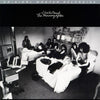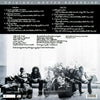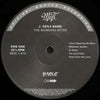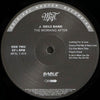







The J. Geils Band - The Morning After (Ultra Analog, Half-speed Mastering)
ORDER LIMITED TO ONE ITEM PER CUSTOMER
Peter Wolf – lead vocals
J. Geils – guitar
Magic Dick – harmonica
Seth Justman – keyboards
Danny Klein – bass
Stephen Jo Bladd – drums
Arranged by The J. Geils Band
Written by Peter Wolf (A1, A5, B2-4), Seth Justman (A1, A5, B2-4), Juke Joint Jimmy (A2, B5), Arlester Christian (A3), Don Covay (A4), Leroy Randolph (A4). Juke Joint Jimmy is a pseudonym used by The J. Geils Band for group compositions
1 LP, standard sleeve
Limited to 3,000 numbered pressings
Original analog Master tape : YES
Half-speed Mastering
Gain 2™ Ultra Analog
Heavy Press : 180g
Record color : black
Speed : 33 RPM
Size : 12'’
Stereo
Studio
Record Press : RTI
Label : MOFI
Original Label : Atlantic
Recorded at Plant West, Los Angeles
Engineered by Bill Szymczyk
Produced by Bill Szymczyk, Seth Justman
Mastered by Krieg Wunderlich at Mobile Fidelity Sound Lab, Sebastopol, CA
Originally released in October 1971
Reissued in August 2019
Tracks:
Side A:
- I Don't Need You No More
- Whammer Jammer
- So Sharp
- The Usual Place
- Gotta Have Your Love
Side B:
- Looking For A Love
- Gonna Find Me A New Love
- Cry One More Time
- Floyd's Hotel
- It Ain't What You Do (It's How You Do It)
Reviews :
“The Morning After is a near perfect follow-up to the J. Geils Band's self-titled debut album. It's more of the same winning blend of rocked-out blues, jumped-up soul, and pure rock & roll wildness with enough attitude and energy to get a club full of people from zero to sweaty in less than 60 seconds. Featuring the original versions of songs that became radio staples in their live incarnations ("Looking for a Love," the Magic Dick showcase "Whammer Jammer"), a batch of covers of rare soul gems ("So Sharp," Don Covay's "The Usual Place," the aforementioned "Looking for a Love"), and some fine originals (the rip-roaring opener "I Don't Need You No More," the very funky "Gotta Have Your Love," and the heart-rending ballad "Cry One More Time," which was covered memorably by Gram Parsons on G.P.), The Morning After is definite proof that the J. Geils Band were well on their way to becoming one of the best rock & roll bands of any era.” AllMusic Review by Tim Sendra
Ultra Analog™ : The GAIN 2 Ultra Analog™ Series stems from the use of the Gain 2 system, mastered at half speed from the original master tapes where possible, capturing and uncovering as before undiscovered sonic information.
Half-speed mastering. In half-speed mastering, the whole process is slowed down to half of the original speed. A typical 33 1/3 rpm record is cut at 16 2/3 rpm. The source material is also slowed down (reducing the pitch in the process) meaning the final record will still sound normal when played back. Slowing the whole process down allows more time, which means the end result sounds better and is more efficient — allowing engineering to minimize the effects of inherent limitations within the vinyl format. The result is a more accurate and more open high-frequency response in the half speed vinyl when compared with a normal speed recording.
Ratings :
AllMusic : 4.52 / 5 ; Discogs : 4.76 / 5


